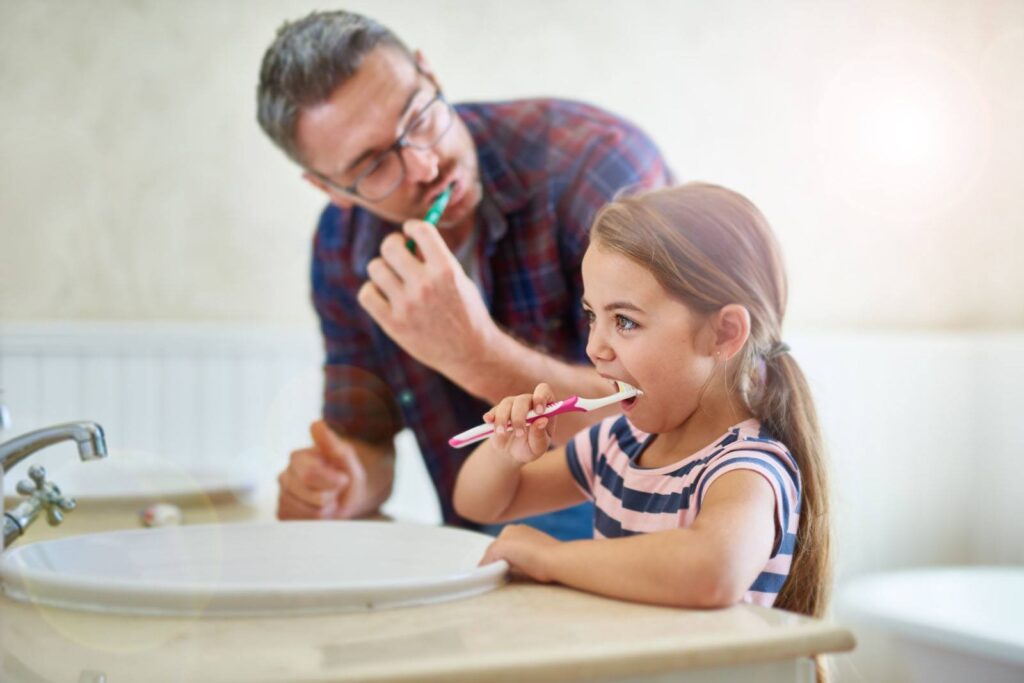
02 Jun 3 Things You Need to Teach Your Kids About Dental Health
 As a parent, you may wonder how to nurture positive feelings about oral hygiene with your children. Starting as early as possible helps to normalize the process of brushing and flossing in their minds.
As a parent, you may wonder how to nurture positive feelings about oral hygiene with your children. Starting as early as possible helps to normalize the process of brushing and flossing in their minds.
With the ongoing Coronavirus (COVID-19) pandemic, it is especially important to teach your children about dental health and oral hygiene. There are ways to make these lessons fun and relatable regardless of their age.
At What Age Should Children Brush Their Teeth?
Starting at infancy, dentists advise practicing oral health by gently wiping down baby’s gums with a damp, soft gauze, or cotton cloth. This process removes residue on the gums left by breastmilk or baby formula. As the first tooth appears, use a soft children’s toothbrush to remove food particles from enamel. While fluoride is a mineral found naturally in water, soil, and air, it is recommended to wait until the age of 3 before children using a toothpaste containing fluoride.
Parents should help their child clean their teeth until age 5 or 6. Use a soft brush and gentle pressure when cleaning. Show them how to brush, how to clean the tongue, inner cheek, and lips. Brushing should be done in soft strokes back and forth, or in a circular motion. Using a hard toothbrush or rough up-and-down motion can injure tender gums. Learning through observation is key – brush your teeth at the same time your child is brushing theirs.
Teaching the Importance of Oral Hygiene
When to brush and how long to brush are important parts of teaching children about dental hygiene. Set recurring morning and evening times to brush so it becomes a natural part of their daily routine. Use children’s’ dental apps to make brushing fun through music, jokes, and short stories all timed to last for two minutes.
As children age, you can expand their knowledge of dental health by teaching about tooth decay and cavities. Conversations can go deeper into other health conditions associated with poor dental care. Each parent should use their own judgment to determine when a child or youth is able to comfortably comprehend the information.
Teaching healthy eating habits plays a role in oral health, as well as total body wellness. Share how good and bad eating habits affect dental health. The message is not to create fear of enjoying the occasional sweet, but rather to instill the importance of brushing afterward.
Incorporating a Visit to the Dentist
Dental anxiety is real for both adults and children. For children, a lack of knowledge about the dentist can cause anxiety. Educate your child about the dentist and the cleaning procedure before going. Books, videos, and online resources can help your child prepare for a visit to the dentist. One example is the PBS video “Daniel Gets His Teeth Cleaned” available on YouTube.
Choose a dentist that you and your child feel comfortable using. A nervous parent will create a nervous child. Set up a safe word so if your child becomes anxious, they can signal to the dentist or parent. Include post-visit rewards for good behavior such as stickers, a healthy treat, or a fancy new toothbrush in their favorite color. Finally, normalize the process of going to the dentist. Be consistent with twice-annual visits so it becomes just another part of your child’s healthy hygiene habits.
At Imperial Dental Center, our goal is to provide a comfortable environment and stress-free experience for our patients. Contact us today to schedule an appointment.

Dragana Angelova
Imperial Dental Center
“We Love to See You Smile”

